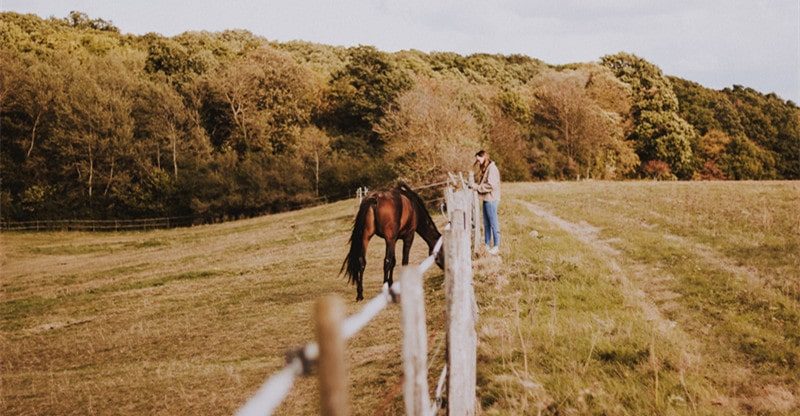Can You Afford a Horse Property?
There’s no denying that property for your horses can be expensive. Between the land, the building(s), the upkeep, and general maintenance and care for the horses, there are more regular expenses than you might not initially realize.
Purchasing a horse property is one thing — but being able to keep it going is quite another. Because of that, many people think owning a horse farm will only ever be a dream. But, it doesn’t need to be.
If you’re truly interested in owning a horse property, do your research. Learn more about your financial options. When you understand the potential expenses, you can start to create a budget. You can also get creative with funding ideas to make your initial purchase and keep things running smoothly.
So, can you afford a horse property? If you’re still “on the fence,” let’s dig a little deeper into what you can expect.
Best Ways to Buy the Property
Before you consider buying a horse property, it’s important to know as much as possible about the land, the buildings that come with it, and the overall value of what you’ll be purchasing. As a rule, you should expect to buy about one acre of land per horse. Acreage costs vary by state, but if you have several horses or some are included in the property, the land itself will set you back quite a bit.
Not enough shelter? If you end up building a barn, expect to spend about $45 per square foot.
We don’t have to tell you that it’s going to be expensive. Most horse property owners or those who are interested already know that. So, what can you do to purchase a property? Is there a smart way to do it?
One of the best (and most common) ways is to take out a bank loan. No one wants to be in debt, but if you want a property now, it’s an easy way to get the funds you need. While getting certain types of loans is typically pretty easy, there are factors that can cause you to get denied, including bad credit. If you’ve been denied a loan more than once, consider:
• Using a co-signer
• Paying off existing debts
• Building/repairing your credit
• Increasing your income
• Shopping for different lenders
Don’t be afraid to apply more than once, either. Work toward improving your chances, and you might get a different result the next time you apply.
If you don’t want to go the loan route, consider other options. Maybe you’ve inherited quite a bit of money — that’s a great way to make a downpayment. But, if your inheritance is in the form of an IRA, be sure to understand the rules about taxes, withdrawal fees, and penalties.
Endless Expenses
Buying a horse property is only half the battle. Upkeep is something you’ll have to consider right away, and educating yourself as much as possible before you make a budget will make the process easier. To do that, you need to understand the most common expenses.
Obviously, you’ll have to pay for the care of every horse. You’ll also have to take care of the property itself. There are also some hidden costs you might not initially consider. Of course, you can go as high-end or low-end as you want — but the hidden costs of horse ownership shouldn’t be ignored. Keep the following in mind when you’re thinking about ongoing expenses:
• Feed
• Hoof care
• Veterinary care
• Riding lessons
• Equipment
In addition to the horses, think about property expenses. For example, you’ll probably want a “nest egg” for maintenance issues that may come up, as well as considerations for making sure everything is always safe and secure. That means regularly repairing and putting up new fencing or working on pens.
Leave no stone unturned when it comes to owning the property and keeping multiple horses there. When you better understand the potential expenses, you can build a better budget.
Creating a Budget to Keep the Property Running
Once you know the major and minor costs of running a horse property, it’s time to create a budget. Your budget is what will help you determine if you can afford it. When you’re creating a budget, it’s important to include everyday expenses, and then everything else possible beyond that. Consider more than just what it will cost to take care of the horses and the property itself while breaking even.
Focus on things like your utility bills, your “fun” non-horse-related everyday expenses like going out to eat or on a trip, or what you spend on entertainment. You might be surprised by how quickly those things can add up. Thankfully, they are also often the easiest to cut back on.
For example, if you tend to dine out at restaurants a lot, try cooking more at home. Do you have a lot of television/movie subscriptions? If there are one or two you can live without, get rid of them.
When it comes to your utility bills, think of ways you can save money with simple changes. Swap out your lights for LED bulbs, check the insulation, invest in EnergyStar appliances, and so on. All of these actions might seem small, in the moment, but they will start to add up when it comes to how much you can save.
Owning a horse property doesn’t have to be out of your financial reach. Do some digging, educate yourself, and make a plan. Taking your time and doing things the right way will make the buying process easier. Plus, it will keep you less stressed, since you’ll know what you can afford and how you’re going to make it work.



